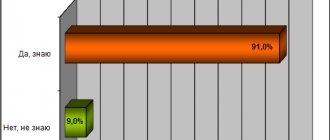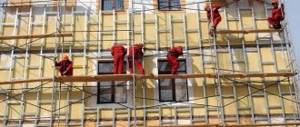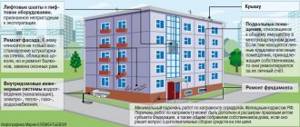Thus, it is legally guaranteed that the amount collected from all residents will not be spent not on just one apartment, but on the common property of the residents, the condition of which largely determines the living conditions of citizens in their apartments. Where does the money for major repairs go? When the state adopted the bill on major repairs, or rather its financing, it tried to take care of literally every moment. So, despite the fact that funds for major repairs are collected along with the monthly rent, nevertheless, the account into which they are subsequently deposited is separate, which ensures that if the need arises for repair work, previously deferred funds will not need to be found.
Failure to pay for major repairs: what are the consequences?
Currently, failure to pay for major repairs will have the following consequences:
- for each day of delay, a penalty will be charged - 1/300 of the key rate of the Central Bank of the Russian Federation (the specified penalty will be accrued until the debt amount is fully repaid);
- debt to pay for major repairs and penalties can be collected in court, after which they are sent for forced deduction from income or at the expense of property;
- If, at the time of the deadline for major repairs, apartment owners are in arrears on payments, their participation in the program may be suspended for full repayment of debts.
Thus, adverse consequences may threaten not only the debtor himself, but also other residents of the apartment building.
How sanctions are applied
The obligation to transfer contributions must be fulfilled monthly. Even in a single case of delay, the debtor begins to accrue a penalty. At the same time, a written notice is sent demanding repayment of the debt. If funds for major repairs are not transferred, the regional operator takes the following measures:
- sends to the magistrate's court an application for the issuance of a court order for the entire amount of the debt and interest, or files a statement of claim;
- on the basis of a judicial act, a writ of execution will be received, these documents are sent to the FSSP service to initiate enforcement proceedings;
- forced collection through bailiffs occurs by withholding wages or other types of income (in an amount not exceeding 50% monthly), or at the expense of property assets.
The capital repair program provides benefits for paying a monthly contribution only for limited categories of citizens (for example, for persons over the age of 70 or 80 years, disabled people, etc.). If the debt arose due to incorrect application of the benefit, you must immediately notify the regional operator about this or submit objections to the court.
This is interesting: Changing your last name in your passport at your own request: how much does it cost and how to do it
The amount of interest will be accrued for the entire period of debt . If the principal debt is collected in court and is not paid by the owners, a claim may be filed for an additional penalty amount. Consequently, the bailiffs may be executing several judicial acts at the same time.
Having received the judicial act and writ of execution, the bailiffs must initiate enforcement proceedings - the resolution will be sent to the debtor by mail. If the amount of debt is relatively small, and the owner is officially employed, the resolution will be sent to his place of work for deduction. Bailiffs can also seize the debtor’s property assets, and if the debt is not paid, sell them at public auction. Suspension of utilities or forced eviction from a residential premises in case of debt for major repairs is not allowed.
If the owners of the house themselves collect monthly payments, they appoint persons responsible for the forced collection of these amounts from debtors. To do this, a written demand is sent, and if it is not fulfilled, a statement of claim is sent to the magistrate or district court. The collected amounts are transferred not to the collector, but to a savings account.
If a statement of claim is sent to the court for the collection of debt and penalties for contributions for major repairs, the debtor may file a petition for a deferment or installment plan. To do this, you need to confirm the validity of the reasons why the debtor cannot fulfill this obligation in a timely manner.
As a rule, the court grants a deferment or installment plan if the debtor cannot find work for a long time and is registered with the employment service, or is undergoing treatment in a medical institution, etc. The judicial act specifies the amount of debt and penalties, as well as the period by which the decision must be executed in full.
Can the court refuse to collect debt and penalties if the apartment building is in unsatisfactory condition? According to the law, citizens living in dilapidated houses that are subject to demolition without restoration are exempt from paying contributions for major repairs. For this purpose, individual legal acts with a list of such objects are adopted at the regional level. The property owners themselves cannot make such a decision - if the house is not included in the specified exclusive list, contributions are paid on a general basis.
Can they sue for non-payment of capital repairs?
Attention:
Benefits for paying for major repairs The law provides a list of categories of citizens who have benefits for paying for major repairs - these include:
- single pensioners over 70 years of age;
- children with disabilities, as well as their parents;
- Chernobyl victims;
- citizens who are war veterans and their relatives;
- persons who participated in nuclear tests at the Semipalatinsk test site;
- citizens with disabilities of the 1st or 2nd group.
The portal bukva-zakona.com draws your attention to the fact that the above categories of citizens may be exempt from paying for major repairs, either fully or partially. So, if a single pensioner is over 80 years old, then he is completely exempt from paying for major repairs; if not, then he is given a 50% discount. In other cases mentioned above, citizens also have the right to receive a 50% discount.
Who is responsible for paying debts?
- Citizens and organizations are required to pay rent and utilities on time and in full.
- The obligation to pay for residential premises and utilities arises from the moment the ownership of such premises arises, taking into account the rule established by Part 3 of Article 169 of this Code (Article 153 of the Housing Code of the Russian Federation).
As follows from this law, the responsibility for paying debts lies with the seller. At the same time, the legislator clarifies that the buyer must still repay a certain type of debt - payment of contributions for major repairs (clause 3, p. 169 of the Housing Code of the Russian Federation).
What are the consequences of failure to pay contributions for major repairs in an apartment building?
Meanwhile, municipalities today refuse to spend their finances on repairs to the housing stock, which is why the column called “Major repairs” appears on invoices. That is, in this way, city residents are invited to prepare in advance for the upcoming major overhaul in a few years, setting aside certain amounts every month. This article will be devoted specifically to this issue, so let’s find the answer to the question of whether to pay or not for major repairs. The concept and essence of major repairs Any building or structure, no matter how well it is constructed, will begin to lose its original parameters over time, for example, holes may appear on the roof (as a result of which, when precipitation occurs, humidity will be not only outside the window, but also inside the room), floors Over the years of use they can also wear out and need to be replaced.
How are fines calculated for major repairs?
If whether penalties can be charged for major repairs is more or less clarified by law, then errors can almost always be found in the application of the Criminal Code of the mechanism for calculating sanctions.
Therefore, all concerned co-owners should understand the algorithm for presenting these additional payments.
An important point in calculating the penalty is the day the fees are paid according to the regulated procedure, since sanctions are imposed from the first day of the missed payment period and are calculated until the assigned amount is repaid. That is, even a short period (a day or two) can be fined.
That is, even a short period (a day or two) can be fined. You should know! If the due payment deadline falls on a weekend, the transfer should be made no later than the next working day following that day. Formally, the accrual should be presented exclusively to the owners of the property.
This rule exempts tenants from paying capital charges. But the apartment rental agreement may contain a condition under which the tenants must pay these fees.
Therefore, when concluding an agreement, it is necessary to carefully study the clauses of the document in order to avoid also receiving sanctions from the FKR.
Social factor
To a regional operator's account Owners of an apartment building can also choose a regional operator's account as a piggy bank for their funds for major repairs, which has several distinctive features compared to a traditional bank account, they are as follows:
- A regional operator is a legal entity.
- An operator can be created exclusively by a subject of the Russian Federation.
- The financial and legal activities of the operator are entirely subject to the legislation in force in the country.
- The operator is not authorized to create its own branches.
- For the activities of the operator, not only he himself is responsible, but also the entity that created him.
Each home has the right to make the choice of a specific organization for accumulating funds for major repairs independently, weighing all the available pros and cons.
Is it legal to pay a penalty for major repairs in 2020?
Where is justice, where is conscience, where is dignity and where is honor. Many people have forgotten about all this. If this does not happen, then there will be no rule of law. Why then is interest not accrued on the funds in the owners’ special account?
This is interesting: Housing program Bashkiria 2020
Accrual of penalties for major repairs: legal grounds
How to get back overpaid money for heating? Discussion In the comment form, you can ask a clarifying question about the text of the article. Please ask all other questions, including requests for clarification of your individual case, through the form above, or through the pop-up window in the lower corner of the screen. Lyudmila - February 11
– these are accrued penalties. Otherwise, penalties for rent will be calculated from 2020 if bills on receipts are not paid for more than 3 months. Starting from the 91st day of non-payment, the tariff established by law increases to 1/130 of the rate.
By virtue of clause 70 of the Rules for the provision of utility services, the amount determined by law or an agreement containing provisions on the provision of utility services, penalties (fines, penalties) for violation by the consumer of the terms of such an agreement is indicated by the contractor in a separate document sent to the consumer.
How are penalties for non-payment of utility bills calculated and how to avoid them?
The payment framework is one calendar month, starting from the 10th. The 11th day of the next month is the day of registration of non-payment. In the banking system, cases often occur when computers malfunction, and a decent citizen who pays all receipts on time finds a check in the mailbox for payment of a fine.
- underpaid to the Fund, that is, the homeowner did not transfer the full amount of funds (on time or later).
- where Ned is the amount of arrears (the contribution was not paid, was transferred in violation of the deadlines and/or incompletely);
- listed in the FKR later than the established deadline;
What are the consequences of failure to pay for major repairs?
The money goes to the Regional Operator Fund or to a special account. Monthly financial resources paid by citizens are collected in a piggy bank, which can be:
- Regional Operator Fund.
- Special account.
Where the funds will be stored must be decided by the payers themselves. Meanwhile, if over time residents decide to change their “piggy bank,” they can do this at any time. The only condition for changing the account is the consent of all residents.
When changing the account, all previously accumulated finances are transferred to a new one, the details of which were provided by the citizens living in the house.
5. All savings will be used to carry out repairs of common property in the house. Financial resources accumulated in the account chosen by citizens can only be spent on major repairs in the house, or rather on common property.
Debts for major repairs will not be written off
716 houses should be overhauled in 2020 in the Volgograd region.
Photo: Inna SHEREMETYEVA
In 2020, the plan for major repairs in the Volgograd region is almost the same in volume as for all previous years combined . the general director of the Regional Overhaul Fund, Aleksey Konotopkin , about how the housing stock is being renewed, what problems arise and how they are being solved .
— In the plan for 2020, we have 716 houses, taking into account those objects that were transferred from 2020, as well as those that were transferred from 2016 due to the termination of contracts with unscrupulous contractors. We were forced to go into legal proceedings and examinations. Since the beginning of the implementation of the overhaul program with 20 contractors, the reoperator has terminated contracts unilaterally.
Of the 716 houses included in this year’s short-term plan, about 30 objects may be excluded from the program - this issue is currently being considered by various commissions. It is quite possible that they will be recognized as beyond repair and emergency. We must deliver the remaining 686 houses this year. To date, almost all contracts have been won, agreements have been concluded, and contractors are working.
According to preliminary estimates, a number of organizations are behind schedule: this concerns somewhere between 10 and 12 houses. In such cases, we consider terminating contracts with contractors who do not fulfill contractual obligations. After termination, repeated competitions will be announced. But we still expect that we will achieve the planned volumes this year.
ABOUT PROBLEMS AND SOLUTIONS
— Last year, many contracts were put up for auction two or three times. The situation has changed?
— The point was that there were not enough contracting organizations that had the right to participate in electronic auctions. They really weren’t enough for the volume that we had in plans. At the same time, advances were not provided, and, as you understand, not every construction organization has enough working capital that would allow it to work without an advance.
To change the situation, we increased the number of commissions for the preliminary selection of contractors and by the end of 2020 we had recruited enough organizations that were eligible to participate in electronic auctions. We also changed the system of contracts: we tightened the requirements for contractors in terms of deadlines, penalties, termination of contracts, inclusion in the “black list”, but at the same time we provided for advance payments. This attracted contractors.
At the end of 2020, competitions were held 2-3 times for 172 houses. And only after we changed the system and the terms of the contracts, the competitions were won back, although in late autumn. At the same time, back in 2020, we were able to speed up work on designing facilities for 2020 and even win back some of the contracts. This allowed the builders to begin repairs in the spring, but in previous years the contractor visited the site in mid-summer at best. That is, we tried to reverse this situation.
— In past years, only the roof and façade were overhauled in houses. And they promised to continue work later...
— Yes, let me remind you that, starting in 2020, all facilities are undergoing comprehensive renovations. This includes the roof, the facade, the foundation, and communications. And already last year, in fulfilling our obligations, we began to return to those sites where only part of the work had previously been completed.
Six hundred houses are currently undergoing major renovations.
Photo: Inna SHEREMETYEVA
VOLGOGRAD RESIDENTS BELIEVE IN OVERHAUL REPAIRS
— Are there many complaints from residents?
— There are complaints, but they have changed – at the substantive level. Previously, residents were not satisfied with the quality of work and had complaints against contractors. They still exist today, but there are much fewer such complaints. Now there is a trend where residents do not agree with the color of the facade or roof. Or they want to use other materials, for example, not a plastered facade, but a ventilated one.
The situation with contractors has also changed. We involved the residents themselves and social activists in the work and control over them. We are actively working with the Regional Center for Public Control in the Housing and Public Utilities Sector. Of course, at the beginning of the fund’s work there was a lot of misunderstanding, the expectation that this was all temporary, that the overhaul program would be cancelled. Today we see a completely different attitude - the desire to do the best possible for ourselves and our home. Residents discuss current, pressing issues: they choose the color of the facade, decide whether they need a blind area, and what material is best to make it from. For us and the contractor there is no difference, but for them it can be very important.
99% of Volgograd residents are ready to work together with a contractor. And experienced builders, when entering a site, first of all try to establish interaction with residents through activists or a senior house manager. When it is there, complaints, as a rule, do not arise.
— There were heavy rains in mid-July. A state of emergency was introduced in Volgograd. The mayor's office is still dealing with the consequences. The roofs of more than 70 houses leaked in the region. How did the houses where the roofs were undergoing major repairs survive the downpours?
— In July 2020, in Volgograd and the region there were requests from residents of only 38 apartments - and this is for 700 houses. Do you agree that there is a difference? Of course, these facts should not have happened, but I think, on the whole, we were able to resist the elements and prevent mass flooding and discontent among residents.
By the way, in 2017 there were also rains, and there were injured property owners, and then we dealt very harshly with the contractors who allowed the roof to leak and were dishonest about compensation for damage. We participated in legal proceedings, and all residents were compensated for all damage. The contractor today understands that in such a situation, first of all, he will suffer seriously financially. Therefore, during the current rains, builders were literally on duty at the sites. Afterwards, we walked through each flooded apartment with them. We agreed on compensation for the damage - money or repairs. However, there are four apartments where no agreement has been reached: the residents have decided to seek damages through the courts.
WHEN THERE IS NO CONSENT WITHIN RESIDENTS
— Do residents often not allow contractors into their apartments?
- Yes, and this problem is quite serious. When we come to the house, we must replace all utilities. But if some apartment did not let us in, we cannot work on the riser, that is, in this case, the entire entrance suffers from the actions of one owner. Today we use modern materials - when replacing the same sewer pipes, we use plastic instead of cast iron. And new materials are not always compatible with old ones, which are installed in the apartments of people who do not want to let contractors in.
Since this problem has not yet been resolved at the legislative level, we have only one option - to go to court. This practice already exists. But there are situations when residents can understand: if a contractor comes in like a bull in a china shop and breaks everything, then we will intervene.
There is also a problem with unauthorized glazed balconies, when we cannot repair the facade: there are such apartments in buildings on Metallurgov Avenue, in the Krasnoarmeysky district. We go out, discuss, decide, look for a way out.
— Which house in Volgograd is the most problematic?
— The most problematic building in Volgograd today is house number 52 on Grazhdanskaya Street. The elder of the house, in our understanding, takes an unconstructive position, plus there are disagreements between the residents of the house. We even had to go to court to force us to allow us to carry out major repairs. But they only managed to repair the roof, but the renovation of the facade was stopped. We haven’t been working for almost a year now, although the balconies have already been cut off.
The fact is that residents demand that we carry out balcony repairs using the specific technology they need. And they insist on it, although they are not experts in this field. The designer concluded that today the use of this technology is impossible due to the lack of material. He proposed a different design solution. We, as experts, believe that it is even better than the original one. But the owners do not allow us to use it. We will still try to restore all the balconies in this house, but only after the situation is resolved in court.
By the way, if the balcony in the house has already collapsed, there are design solutions that allow us to restore it. But there are also situations when this is impossible. One such house is located in the Kirovsky district, where, due to destruction, the balcony was demolished by the Criminal Code. After the examination, we were given the conclusion that there are no design solutions for the safe restoration of this balcony. So far this is the only case in the region.
THE CONTRACTOR WILL PAY FOR THE DISRUPTION
— Often do contractors have to return houses under warranty?
- Unfortunately, there are such cases - mostly we are talking about facades and roofing.
An example is house number 6 on Titova Street. The contractor made a defect, the plaster began to crumble from the facade and from the balconies. Each contractor has a warranty period during which it is obliged to eliminate all its deficiencies. This is at least five years. At our request, some of the work on the main facade was completed in the house. From the yard - no. Now we are dealing with the contractor in court. But, without waiting for a decision, we hired another organization to carry out the repair work. And then we will recover their cost through the court.
This is what the recently renovated house on Titova 6 looks like now.
Photo: Inna SHEREMETYEVA
According to communications, warranty cases rarely arise. The only case in my memory was problems with heating at the address Kirpichny village, 8. The contractor was forced to redo everything, but as it turned out, it was a defect of the supplier and the material. And the supplier agreed to redo everything at his own expense.
It happens that the contractor did the job and gave a 5-year guarantee. But then, for example, he went bankrupt. We are left with those problems that may arise during the warranty period and must look for money to eliminate the defect. To solve this problem, it is now proposed to introduce an insurance system.
That is, when concluding a contract, the contractor enters into an agreement with the insurance company and it reimburses the costs if a warranty case arises. Either he will compensate for the damage or the costs. But, let me emphasize, we should no longer expect any global changes in legislation in the field of major repairs - they have already happened, and now we are fine-tuning the system.
Another contractor is redoing the defect.
Photo: Inna SHEREMETYEVA
IDEAL - COMPLEX REPAIR OF THE YARD, HOUSE AND ENTRANCES
— Readers often contact our editorial office asking when they will overhaul the entrances.
— In the entrances, we work only in terms of replacing electrical wiring, windows and finishing of slopes, replacing utilities where risers run along the entrances. The entrance itself is not being updated using capital repairs. We always tell management companies: we have done the facade, communications, and after that you repair the entrance. Many people go for it. Then you get a whole complex. Now we are also trying to combine our program with the “Formation of a Comfortable Urban Environment” project, within the framework of which internal passages in courtyards are being repaired and lighting is being restored. This is how it should be ideally. But here it is not always possible to adapt: our plans for major repairs are scheduled 30 years in advance, and yards to participate in this project are selected by competition every year.
OWED A BILLION
— Do Volgograd residents pay for major repairs regularly?
— At the beginning of the overhaul program, we collected 45% of assessed contributions. Since January 2020, we have reached 88% collection rate. All major debts accumulated between 2014 and 2020, when people did not believe in the capital repair program. Today the situation has changed dramatically. Residents pay, now they talk about quality, make suggestions, and become active participants in the process.
In general, Volgograd residents currently owe about a billion rubles for major repairs. We work in courts, with bailiffs. The volume is large and we do not have enough lawyers. But everyone must remember that it is impossible not to pay for major repairs. The debt will not go away and will not be forgotten, although many hope that three years will pass and it will be written off.
By the way, there were many meetings on this issue at the level of the Ministry of Construction of the Russian Federation. Now they are planning to amend the legislation, according to which the statute of limitations for debts for major repairs will be abolished.
Another sore point for us is the state duty. We are a budgetary organization; we do not live on the money we collect from the population, as many people believe. The Overhaul Fund is a subordinate institution of the regional housing and communal services committee. All our expenses are paid from the regional budget. Given the difficult situation, of course, they are not giving us extra money. At the government level, they are now also deciding on the issue of exempting funds from paying state duties. If these decisions are made in the fall, the situation will immediately change.
The largest defaulter is the Volgograd City Hall. The debt exceeded 180 million rubles. But in the end, with the help of the regional administration, we found a compromise solution and signed a settlement agreement. The debt restructuring mechanism has been developed and scheduled for several years. Today, along with the debts of past years, the Volgograd administration has begun to pay current contributions.
Contractors will receive 3.71 billion rubles upon completion of major repairs.
Photo: Inna SHEREMETYEVA
OVERHAUL IN NUMBERS
827 apartment buildings have been renovated under the capital repair program in the Volgograd region since 2014. Of them:
34 - in 2014,
260 - in 2020,
275 - in 2020,
258 - in 2020.
716 houses should be renovated in 2020, of which by mid-August:
at 98 - work completed,
in 596 - major repairs should be completed in 2020,
at 17 - bidding is underway;
5 - in the design stage.
for 3.71 billion rubles .
2.16 billion rubles are in the account of the regional operator.
Contribution for major repairs - is it obligatory to pay?
The specified payment must be transferred monthly according to the following rules:
- the basic tariff for paying for major repairs is approved by regional authorities and may differ in different regions of the Russian Federation;
- by a general decision of the residents, the specified tariff can be increased - for carrying out additional types of work during major repairs, for carrying out early repairs, etc.;
- the payment amount is calculated based on the living space per owner - the larger the apartment, the higher the payment amount will be;
- Administration of payments for major repairs is carried out by the regional operator (Capital Repair Fund), or the general meeting of owners (if they voted to open their own savings account).
Although the tariff for major repairs differs among the constituent entities of the Russian Federation, the procedure for applying penalties will be the same.
Important
The amount of debt can be written off by the fund itself if the owner of the premises proves the illegal occurrence of benefits (banking error, incorrect calculation of contributions, etc.).
Can they be evicted from an apartment for non-payment of the capital repair fee? Eviction from an apartment for non-payment of debts for major repairs and other utilities is a rather rare occurrence. The consequences can go so far, but in this case the debt must accumulate over decades and be equal to the market value of the property.
Info
If significant flaws appear in the integrity of the structure, a major repair is carried out, that is, restoration of the premises. It is necessary to distinguish between the concepts of major and current repairs. So, if major repairs are thorough work to preserve the building in a condition suitable for its use, then current repairs are painting, wallpapering, that is, embellishing the room, changing its color scheme.
General provisions of the Housing Code on major repairs Today, planning and accounting for payments for upcoming major repairs is under strict state control, therefore the general provisions on the work in question and their cost are stipulated by the Housing Code of Russia.
Receiving information by address
The most “labor-intensive” way to get acquainted with data on the debt for major repairs is to personally go to the regional office of the Capital Repair Fund for Apartment Buildings. As a rule, people who apply to a management company or a homeowners' association (HOA) are also addressed there. It is recommended to have with you:
- certificate of ownership;
- identification document.
ATTENTION!
When completing a purchase and sale transaction, the owner, at the buyer’s request, must issue a certificate confirming the absence of debt for major repairs.
In practice, in most cases this document is necessary, since if there is a debt, the new owner of the property will have to pay it.
IMPORTANT!
The owner of the property or a person registered in the area has the right to receive information about the address in the Overhaul Fund.
To save your own time, before going to the appointment, it is better to find out the operating hours of the department.
Liability for failure to pay for major home repairs
As a result, we have the following concept.
Contributions for major repairs are a monthly payment paid by property owners aimed at repairing common property in an apartment building. When it is possible not to pay contributions for major repairs Contributions for major repairs are not paid only if the house is recognized as unsafe and subject to demolition, as well as if the executive body of state power or local government decides to confiscate the land plot on which it is located for state or municipal needs this apartment building, and about the seizure of each residential premises in this apartment building. Thus, in accordance with current legislation, payment of contributions for major repairs is mandatory.
Who should pay contributions for major repairs In accordance with the requirements of Art.
When is the penalty calculated?
What happens if you don’t pay for major repairs, don’t transfer contributions, will fines be applied to such homeowners?
Those who are accustomed to paying utility bills on time and understand the responsibility for their home, not just their apartment, do not have to accumulate debt and look for ways to pay it off. But some irresponsible residents expect free services and do not pay receipts for major repairs.
IMPORTANT! Debtors should know that they are subject to liability for debts in accordance with Article 155 of the Housing Code. This article not only obliges them to pay receipts for major repairs, but also provides for various consequences of non-payment.
In particular, interest is accrued to debtors for non-payment of contributions; they replenish the FCR. But this is not a penalty, according to the Fund’s explanations, since additional interest on overdue payments, as well as the contributions themselves, are used for repair work. The law on non-payment was adopted a long time ago; all residents should have become familiar with its provisions and understand the need to jointly pay for repairs in their home.
The amount of interest, or as many call it, penalties, depends only on the amount of debt. Apartment owners may not pay the fees in full, pay late or pay in part.
Each of these cases of late payments only leads to an increase in the payment amount. Therefore, residents who ask the question “what are the consequences of non-payment of contributions specifically for me?” must take into account the period of delay and the accumulated amount of the contribution.
The standard formula is used to calculate the interest that needs to be contributed to the Capital Repair Fund - P = Week * StRef / 300. In this case, Ned is the non-payment (its amount), and StRef is the refinancing rate of the Central Bank. The rate must correspond to the current moment; it can be found out when contacting the bank.








